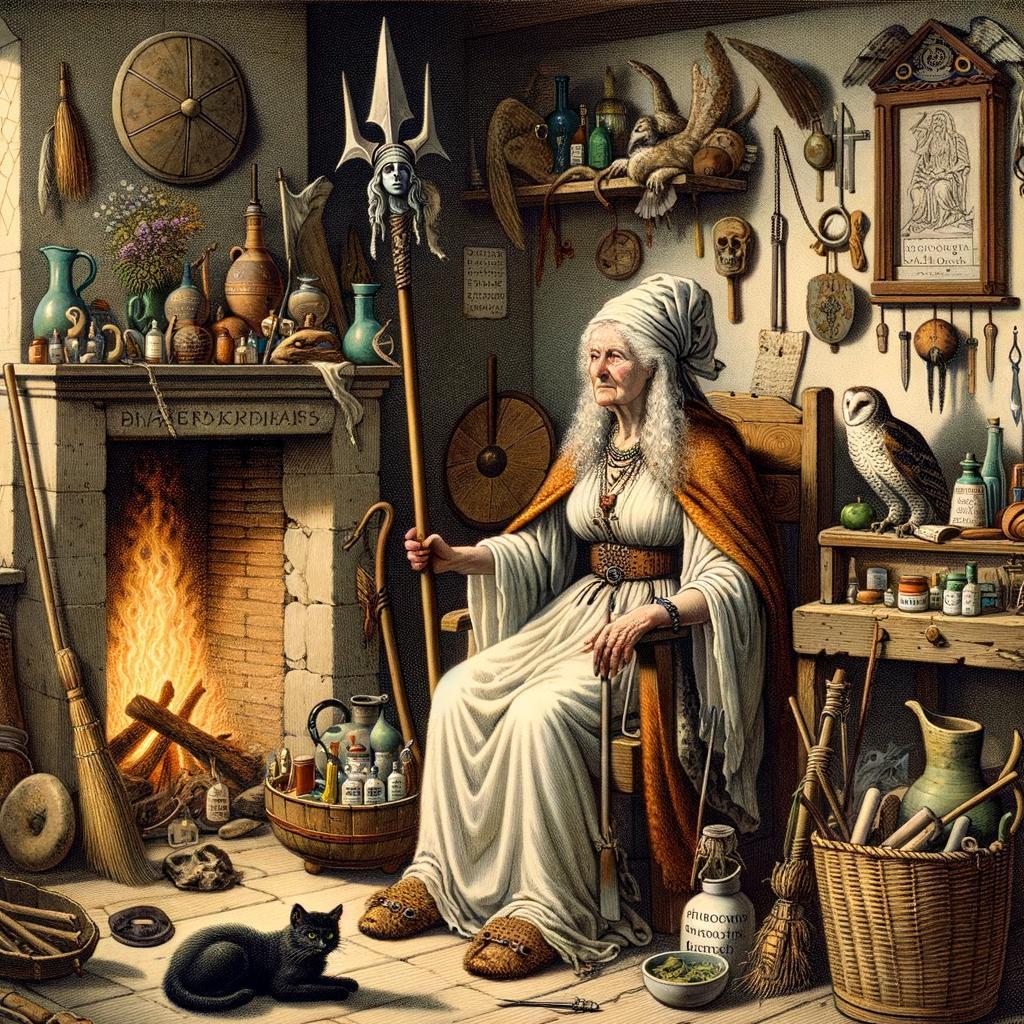The Witch Craze
AI and Folklore
Posted by Chris Sissons on Jan 31, 2024
AI and Folklore » Chris Sissons and Minerva
Minerva has been beavering away, researching The Witch Craze. This is another topic where folklore and reality intersect. What is a witch? We mostly imagine a warty-nosed crone riding a broomstick or if you are as ancient as I am, Samantha, the beautiful witch in the sitcom, Bewitched. Shakespeare's witches in Macbeth possibly cemented the popular image of witches in place. (And led to Verdi’s Macbeth, the only opera with a chorus of bearded women!) And of course, Terry Pratchett through Granny Weatherwax and her coven, illustrates something of the real-life range of practices that were possibly seen as witchcraft.
I suspect most real-world witches would not have thought of themselves as witches until they heard the knock at the door. They were wise women, called upon when people encountered problems they could not solve themselves. They were the doctors, midwives and counsellors of their day.
Minerva tells me, “The witch craze, also known as the witch hunts or witch trials, unfolded over several centuries and peaked in Europe during the late 16th and 17th centuries. This historical phenomenon was marked by a widespread fear and persecution of individuals, predominantly women, accused of practicing witchcraft. The motivations behind the pursuit and condemnation of these alleged witches were complex and multifaceted.”
There are many accounts of the Witch Craze and if you are interested, it’s not difficult to find books accounting for the history of this period. The point I want to make about AI is how specious arguments were turned into hysterical persecution of overwhelmingly innocent people, mostly elderly women. Folktales, fictions and fabrications took on a life of their own. We look back and ask ourselves how anyone could believe this stuff. And yet, the world still abounds with similar stories, for example, the anti-Semitic blood libel, the QAnon stories of satanic baby murderers and so on.
These beliefs motivate people to extremist actions even though they are entirely fictional. To trust in our technologies carries with it the same dangers. We do not know where such faith will take us.
The reasons for the Witch Craze are complex, as Minerva warns but here are some of the main ones:
- The need for scapegoats, given the upheavals of the 17th century
- Theological justifications that stoked fear. Minerva says, “The Malleus Maleficarum, a notorious witch-hunting manual published in 1487, provided a theological justification for the persecution of witches, contributing to the spread of paranoia and fear.”
- Persecution of those on the margins of society.
- Settling of personal vendettas.
The last one is perhaps more important than it first appears. Some historians consider one of the reasons for the witch craze was the increasing professionalisation of the medical profession. Male doctors saw wise women as competitors. Minerva believes this was a minor element but it is suggestive of the values associated with the rise of science. She says the witch craze ended with the increasing application of reason.
And yet, in this age of reason, we still see mass support for conspiracy theories. To what extent in an age of populism, can we claim rationality as a universal certainty? AI cannot help us distinguish truth from fiction. If we believe it can, we leave ourselves open to deception and lies.
This is the twenty-second in a series of posts about AI and Folklore. I define Folklore as inclusive of religious stories and some from modern popular culture. Minerva assists in all the posts, sometimes without attribution!
The first post in the series is Life with Minerva. The last post was Three Laws and the next is Frieren. If you press the button marked "Follow", you'll receive notice of new posts.
As always, please comment. As well as your insights into AI and Folklore, I'd appreciate suggestions of stories I might cover. These could be from folktales, myths, religious stories as well as general literature.
Minerva is the Goddess of Wisdom and so she knows everything there is to know about wise women! Apparently, this is a self-portrait. I'm sure we all agree she is not at all scary!

Comments
Leave a comment.
Leave a comment.



 )
)